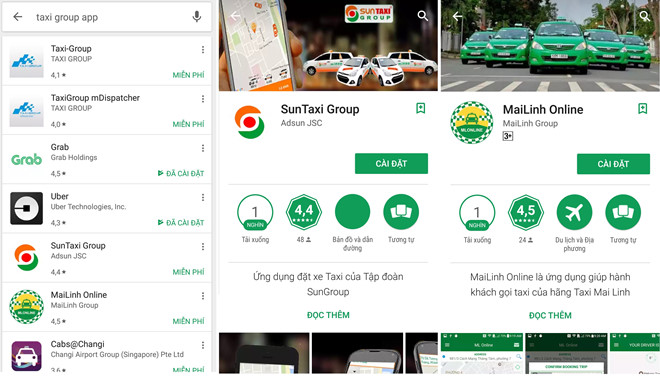As Uber and Grab are gradually coming to dominate the domestic taxi market which has numerous potential to exploit, a series of Vietnamese technological groups and traditional taxi companies have invested in their own ride hailing applications to compete.
Fighting fire with fire

According to the latest move, Viettel Telecom recently signed a comprehensive strategic cooperation agreement to purchase 30 per cent of Vietnamese transportation startup Gonow, officially joining the online ride hailing market.
Accordingly, Viettel will provide Gonow with support in developing its website, sales network, customer care system, and payment services. Founded one year ago, Gonow is a platform which connects drivers and car owners with customers to provide passenger and goods transport services, as well as car leasing.
However, Gonow, Uber, and Grab target different customer bases. Accordingly, Gonow focuses on car leasing services for tour-travel trips and customers looking for long-distance trips between provinces.
Gonow currently operates in 63 cities and provinces nationwide and plans to expand to international markets from the end of 2018.
At present, the platform has more than 170,000 members, a whopping rise from the just 3,500 in the first quarter of this year.
Previously, in late 2016, 123Xe, another Vietnamese ride-hailing developed by VNG, was officially launched, marking VNG’s endeavour into the ride-hailing market. Due to its late launch, 123Xe focused on a niche market, accepting only customers who travel from 15 to 500 kilometres.
However, VNG’s service is considered an advantage compared to Uber and Grab because the 123Xe application permits customers to hail cars between 4-45 seats, while Uber and Grab’s fleets consist of four and seven-seaters only.
Along with Gonow and 123Xe, numerous ride-hailing applications like Vivu, Rada, iMove and Go-ixe have been launched to directly compete with Uber and Grab.
Traditional taxi companies join the fray
In late September, Mai Linh Mien Bac, a major taxi company in Vietnam owned by Mai Linh Group, officially launched motorbike transport services called M.Bike and M.Bike Premium, to compete with uberMoto and GrabBike.
Besides, Thanh Cong Taxi Group introduced the @ThanhCongApp application to become the first taxi company in Vietnam to apply technology based on Chatbot, the latest technology of Facebook. At present, @ThanhCongApp is present in five cities and provinces, including Hanoi, Ha Nam, Vinh Phuc, Quang Ninh, and Thua Thien-Hue.
Furthermore, other taxi companies, namely Taxi Group, The Ky Moi, Sao Thu Do, and Vinasun have also implemented their own ride hailing applications with interfaces similar to those of Uber and Grab.
Uber and Grab’s additional advantages
According to technological developers and traditional taxi companies, it is simple and cheap to invest in ride-hailing applications to compete with Uber and Grab, however, in reality, the two major rivals have other advantages in terms of fare, promotion programmes, and tax incentives, making it difficult to break their hold on the market.
Notably, both Uber and Grab have the strong financial foundations and do not suffer from price restrictions, thus they continually launch promotion and discount programmers to lure in customers. Meanwhile, traditional taxi companies have to comply with price regulations.
Furthermore, traditional taxi companies have to pay a series of taxes, including 10 per cent added-value tax (VAT), 20 per cent corporate income tax, and other fees, while Uber and Grab only need to pay 2 per cent corporate income tax and 3 per cent added-value tax.
Additionally, taxis are subject to 13 different lines of regulations, such as being prohibited from entering certain road sections during peak hours, and from altering fares, among others.
VIR